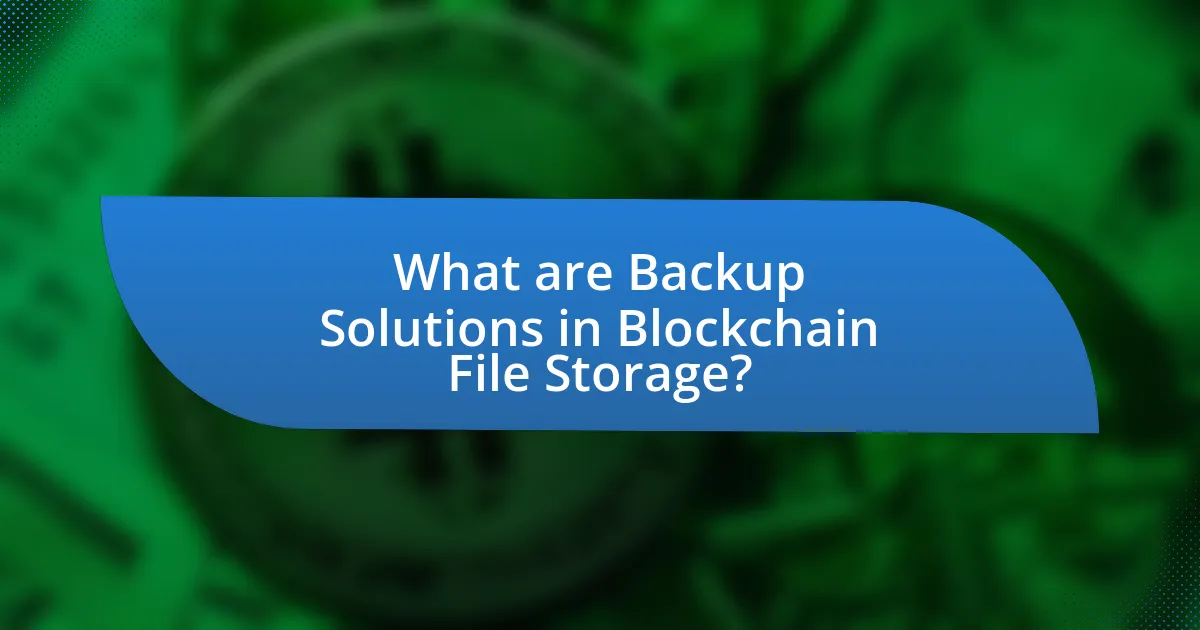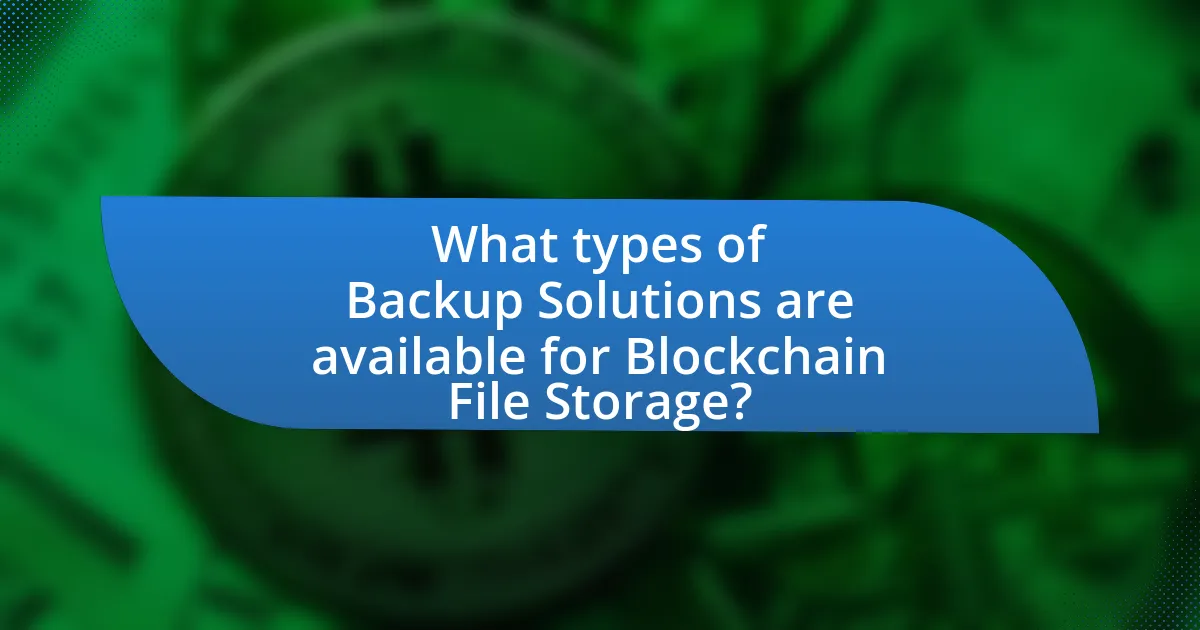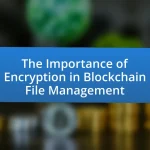Backup solutions in blockchain file storage are essential mechanisms that ensure the preservation and recovery of data within decentralized networks. These solutions leverage technologies such as IPFS and Filecoin to create redundant copies of data across multiple nodes, enhancing data integrity and security while mitigating risks associated with data loss. The article explores the functionality of these backup solutions, the technologies involved, and their critical importance in maintaining data availability and resilience against threats like cyberattacks and hardware failures. Additionally, it addresses the challenges organizations face in implementing effective backup strategies, regulatory considerations, and future trends in blockchain backup solutions.

What are Backup Solutions in Blockchain File Storage?
Backup solutions in blockchain file storage are mechanisms designed to ensure the preservation and recovery of data stored on blockchain networks. These solutions utilize decentralized storage systems, such as IPFS (InterPlanetary File System) or Filecoin, to create multiple copies of data across various nodes, enhancing data redundancy and security. By distributing data across a network, these backup solutions mitigate risks associated with data loss due to node failures, cyberattacks, or accidental deletions. The effectiveness of these solutions is supported by the inherent characteristics of blockchain technology, which provides immutability and transparency, ensuring that backup data remains tamper-proof and easily verifiable.
How do Backup Solutions function within Blockchain File Storage?
Backup solutions in blockchain file storage function by creating redundant copies of data across multiple nodes within the blockchain network. This redundancy ensures that even if one node fails or data becomes corrupted, the information remains accessible from other nodes, thereby enhancing data integrity and availability. For instance, blockchain technology employs cryptographic hashing and consensus mechanisms to verify and secure these backups, ensuring that all copies are consistent and tamper-proof. This decentralized approach to data backup not only mitigates the risk of data loss but also reinforces the overall resilience of the blockchain system, as evidenced by the inherent design of blockchain networks like Bitcoin and Ethereum, which utilize distributed ledger technology to maintain multiple copies of transaction data across a global network of nodes.
What technologies are involved in Blockchain Backup Solutions?
Blockchain backup solutions primarily involve distributed ledger technology, cryptographic algorithms, and decentralized storage systems. Distributed ledger technology ensures that data is replicated across multiple nodes, enhancing data integrity and availability. Cryptographic algorithms secure the data, providing encryption and authentication to prevent unauthorized access. Decentralized storage systems, such as IPFS (InterPlanetary File System) or Filecoin, facilitate the storage of blockchain data in a manner that is resilient to single points of failure. These technologies collectively ensure that blockchain data remains secure, accessible, and recoverable in the event of data loss or corruption.
How do these technologies ensure data integrity and security?
Blockchain technologies ensure data integrity and security through decentralized consensus mechanisms and cryptographic techniques. Decentralization prevents a single point of failure, as data is distributed across multiple nodes, making unauthorized alterations nearly impossible. Cryptographic hashing secures data by creating unique digital fingerprints for each block, ensuring that any change in the data alters the hash, thus signaling tampering. Additionally, smart contracts automate and enforce agreements, reducing human error and enhancing security. These methods collectively create a robust framework that maintains the integrity and security of data stored on the blockchain.
Why are Backup Solutions critical for Blockchain File Storage?
Backup solutions are critical for blockchain file storage because they ensure data integrity and availability in the event of data loss or corruption. Blockchain technology, while inherently secure and decentralized, is not immune to risks such as hardware failures, cyberattacks, or human errors that can lead to data loss. For instance, a study by the International Journal of Information Management highlights that 60% of companies that lose their data will shut down within six months. Therefore, implementing robust backup solutions mitigates these risks by providing a reliable means to restore lost data, thereby maintaining the continuity and reliability of blockchain applications.
What risks are associated with not having Backup Solutions?
Not having backup solutions exposes organizations to significant risks, including data loss, operational downtime, and financial repercussions. Data loss can occur due to hardware failures, cyberattacks, or accidental deletions, leading to the permanent loss of critical information. Operational downtime can result from the inability to access data, which disrupts business processes and affects productivity. Financial repercussions may arise from recovery costs, loss of revenue during downtime, and potential legal liabilities if sensitive data is compromised. According to a study by the Ponemon Institute, 60% of small businesses that experience data loss close within six months, highlighting the severe impact of inadequate backup solutions.
How do Backup Solutions mitigate data loss in Blockchain environments?
Backup solutions mitigate data loss in blockchain environments by creating redundant copies of blockchain data, ensuring that information can be restored in case of corruption or loss. These solutions utilize techniques such as snapshotting and off-site storage to maintain data integrity and availability. For instance, regular backups can capture the state of the blockchain at specific intervals, allowing recovery from the last known good configuration. Additionally, decentralized backup methods can distribute copies across multiple nodes, reducing the risk of a single point of failure. This approach is supported by the fact that blockchain data is immutable, meaning that once recorded, it cannot be altered; thus, having backups ensures that original data can be retrieved if necessary.

What types of Backup Solutions are available for Blockchain File Storage?
There are several types of backup solutions available for blockchain file storage, including decentralized storage systems, cloud-based backups, and on-premises solutions. Decentralized storage systems, such as IPFS (InterPlanetary File System) and Filecoin, utilize a distributed network to store data across multiple nodes, enhancing redundancy and security. Cloud-based backups involve using services like Amazon S3 or Google Cloud Storage, which provide scalable and reliable storage options with automated backup features. On-premises solutions allow organizations to maintain physical control over their data by storing backups on local servers, ensuring quick access and compliance with data regulations. Each of these solutions offers unique advantages, such as improved data integrity, accessibility, and disaster recovery capabilities, making them essential for effective blockchain file storage management.
How do centralized and decentralized Backup Solutions differ?
Centralized backup solutions store data in a single location, while decentralized backup solutions distribute data across multiple locations or nodes. Centralized systems offer easier management and faster recovery due to their singular control point, but they are more vulnerable to single points of failure and security breaches. In contrast, decentralized systems enhance data redundancy and security by spreading data across various nodes, making them less susceptible to attacks or failures. This distinction is crucial in blockchain file storage, where data integrity and availability are paramount, as decentralized solutions align with the blockchain’s inherent design of distributed trust and resilience.
What are the advantages and disadvantages of centralized Backup Solutions?
Centralized backup solutions offer several advantages and disadvantages. The primary advantage is simplified management, as all data is stored in a single location, making it easier to monitor and maintain. This centralization can lead to cost savings in terms of hardware and administrative resources, as organizations can invest in a robust infrastructure rather than multiple decentralized systems. Additionally, centralized solutions often provide enhanced security features, such as encryption and access controls, which can protect sensitive data more effectively.
Conversely, the main disadvantage of centralized backup solutions is the risk of a single point of failure. If the central server experiences a failure or is compromised, all backed-up data may become inaccessible or lost. Furthermore, centralized systems can be vulnerable to cyberattacks, as attackers may target the single location where data is stored. This reliance on one system can also lead to performance bottlenecks, especially during peak usage times, potentially slowing down data retrieval and backup processes.
What are the advantages and disadvantages of decentralized Backup Solutions?
Decentralized backup solutions offer enhanced security and redundancy but also present challenges in management and accessibility. The primary advantage is that data is distributed across multiple nodes, reducing the risk of a single point of failure and enhancing data integrity; for instance, blockchain technology inherently provides tamper-proof records. Additionally, decentralized systems often improve privacy, as users retain control over their data without relying on a central authority. However, disadvantages include potential difficulties in data retrieval, as users may face challenges accessing their backups if nodes become unavailable. Furthermore, the complexity of managing decentralized systems can lead to higher operational costs and require more technical expertise compared to centralized solutions.
What are the best practices for implementing Backup Solutions in Blockchain?
The best practices for implementing backup solutions in blockchain include ensuring data redundancy, utilizing decentralized storage, and regularly testing backup integrity. Data redundancy involves creating multiple copies of blockchain data across different nodes to prevent loss from single points of failure. Decentralized storage solutions, such as IPFS or Filecoin, enhance security and accessibility by distributing data across a network rather than relying on a central server. Regular testing of backup integrity is crucial to confirm that backups are functional and can be restored effectively, which is supported by industry standards that recommend routine verification of backup systems to ensure reliability.
How often should backups be performed in Blockchain systems?
Backups in blockchain systems should be performed regularly, ideally daily or weekly, depending on the transaction volume and criticality of the data. Regular backups ensure that the system can recover from data loss or corruption, which is crucial given the immutable nature of blockchain technology. For instance, high-frequency trading platforms or applications with significant transaction activity may require daily backups to minimize data loss, while less active systems might suffice with weekly backups. This frequency aligns with best practices in data management, where timely backups are essential for maintaining data integrity and availability.
What tools can be used to automate Backup Solutions in Blockchain?
Tools that can be used to automate backup solutions in blockchain include Duplicati, Bacula, and Veeam. Duplicati is an open-source backup software that supports various storage backends and can be configured to back up blockchain data automatically. Bacula is an enterprise-level backup solution that offers automation features for managing backups across different systems, including blockchain nodes. Veeam provides backup and recovery solutions that can be integrated with blockchain environments, ensuring data integrity and availability. These tools facilitate automated backups, which are essential for maintaining the security and reliability of blockchain file storage.

What challenges do organizations face with Backup Solutions in Blockchain File Storage?
Organizations face several challenges with backup solutions in blockchain file storage, primarily related to data immutability, scalability, and regulatory compliance. The immutable nature of blockchain means that once data is recorded, it cannot be altered or deleted, complicating traditional backup processes that rely on data modification. Additionally, as blockchain networks grow, the volume of data increases, leading to scalability issues in backup solutions that may struggle to efficiently manage large datasets. Furthermore, organizations must navigate complex regulatory environments that dictate how data should be stored and backed up, which can vary significantly across jurisdictions. These challenges highlight the need for innovative backup strategies tailored to the unique characteristics of blockchain technology.
How can scalability issues impact Backup Solutions?
Scalability issues can significantly hinder backup solutions by limiting their ability to efficiently manage increasing data volumes. As organizations grow, their data storage needs expand, and if backup solutions cannot scale accordingly, they may experience slower backup processes, increased recovery times, and potential data loss. For instance, a study by IDC indicates that 60% of organizations face challenges in scaling their backup infrastructure to meet growing data demands, which can lead to inadequate data protection and higher operational costs. Therefore, the inability to scale effectively can compromise the reliability and efficiency of backup solutions in a blockchain file storage context.
What strategies can be employed to overcome scalability challenges?
To overcome scalability challenges in blockchain file storage, implementing sharding is an effective strategy. Sharding divides the database into smaller, more manageable pieces, allowing for parallel processing and reducing the load on any single node. This method has been successfully utilized in various blockchain projects, such as Ethereum 2.0, which aims to enhance transaction throughput by distributing data across multiple shards. Additionally, employing off-chain solutions, like state channels, can alleviate congestion by allowing transactions to occur outside the main blockchain, thus improving scalability without compromising security. These strategies are validated by ongoing developments in blockchain technology that focus on enhancing performance and efficiency.
What regulatory considerations should be taken into account?
Regulatory considerations in blockchain file storage include data privacy laws, compliance with financial regulations, and intellectual property rights. Data privacy laws, such as the General Data Protection Regulation (GDPR) in Europe, mandate that personal data must be processed lawfully, transparently, and for specific purposes. Compliance with financial regulations, such as the Securities and Exchange Commission (SEC) guidelines in the United States, is crucial for blockchain applications that involve financial transactions or securities. Additionally, intellectual property rights must be respected to protect the ownership of digital assets stored on the blockchain. These regulations ensure that blockchain file storage solutions operate within legal frameworks, safeguarding user data and maintaining trust in the technology.
How do data protection laws affect Backup Solutions in Blockchain?
Data protection laws significantly influence backup solutions in blockchain by imposing strict requirements on data handling, storage, and access. These regulations, such as the General Data Protection Regulation (GDPR) in Europe, mandate that personal data must be processed securely and that individuals have rights over their data, including the right to be forgotten. Consequently, backup solutions must be designed to ensure compliance with these laws, which may involve implementing features like data encryption, access controls, and the ability to delete data from backups when requested. For instance, GDPR requires that organizations can delete personal data upon request, necessitating backup systems that can efficiently manage and remove such data without compromising the integrity of the blockchain.
What are the future trends in Backup Solutions for Blockchain File Storage?
Future trends in backup solutions for blockchain file storage include increased integration of decentralized storage networks, enhanced encryption methods, and the adoption of automated backup protocols. Decentralized storage networks, such as IPFS and Filecoin, are gaining traction as they provide redundancy and resilience against data loss. Enhanced encryption methods are being developed to ensure data integrity and security, addressing concerns over unauthorized access. Additionally, automated backup protocols utilizing smart contracts are emerging, allowing for seamless and efficient data management. These trends are supported by the growing demand for secure and reliable data storage solutions in the blockchain ecosystem.
How is artificial intelligence influencing Backup Solutions?
Artificial intelligence is significantly enhancing backup solutions by automating data management processes and improving data recovery efficiency. AI algorithms analyze data patterns to optimize backup schedules, ensuring that critical data is backed up more frequently and reducing the risk of data loss. For instance, AI-driven predictive analytics can identify potential failures in storage systems before they occur, allowing for proactive measures to be taken. According to a report by Gartner, organizations that implement AI in their backup solutions can reduce recovery time by up to 50%, demonstrating the tangible benefits of integrating AI technologies in data protection strategies.
What innovations are on the horizon for Blockchain Backup Solutions?
Innovations on the horizon for Blockchain Backup Solutions include the integration of decentralized storage networks, enhanced encryption methods, and automated backup protocols utilizing smart contracts. Decentralized storage networks, such as Filecoin and Storj, allow for distributed data storage, reducing reliance on single points of failure and increasing data redundancy. Enhanced encryption methods, including quantum-resistant algorithms, aim to secure data against future threats, ensuring long-term integrity. Automated backup protocols using smart contracts facilitate seamless and reliable data backups, minimizing human error and operational costs. These advancements are driven by the growing need for secure, efficient, and resilient data management in blockchain environments.
What practical tips can organizations follow for effective Backup Solutions in Blockchain?
Organizations can implement several practical tips for effective backup solutions in blockchain. First, they should utilize decentralized storage systems to ensure redundancy and resilience against data loss. This approach leverages multiple nodes to store data, reducing the risk of a single point of failure. Additionally, organizations must regularly schedule automated backups to capture data changes in real-time, ensuring that the most current information is preserved.
Furthermore, employing encryption for backup data is crucial to protect sensitive information from unauthorized access. Organizations should also conduct periodic testing of backup restoration processes to verify that data can be reliably recovered when needed. Lastly, maintaining comprehensive documentation of backup procedures and configurations aids in streamlining recovery efforts and ensuring compliance with regulatory requirements. These strategies collectively enhance the reliability and security of blockchain data backups.


